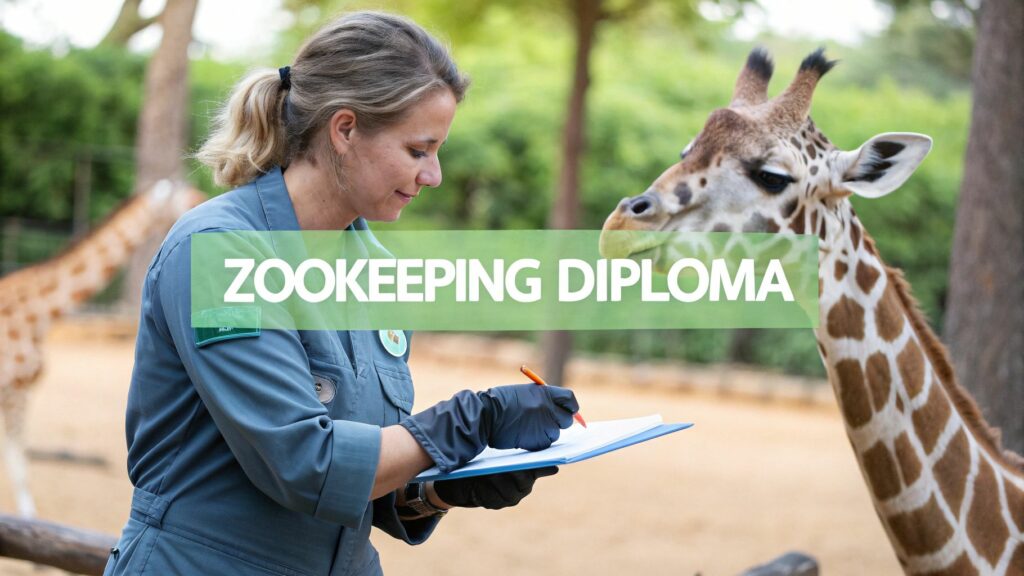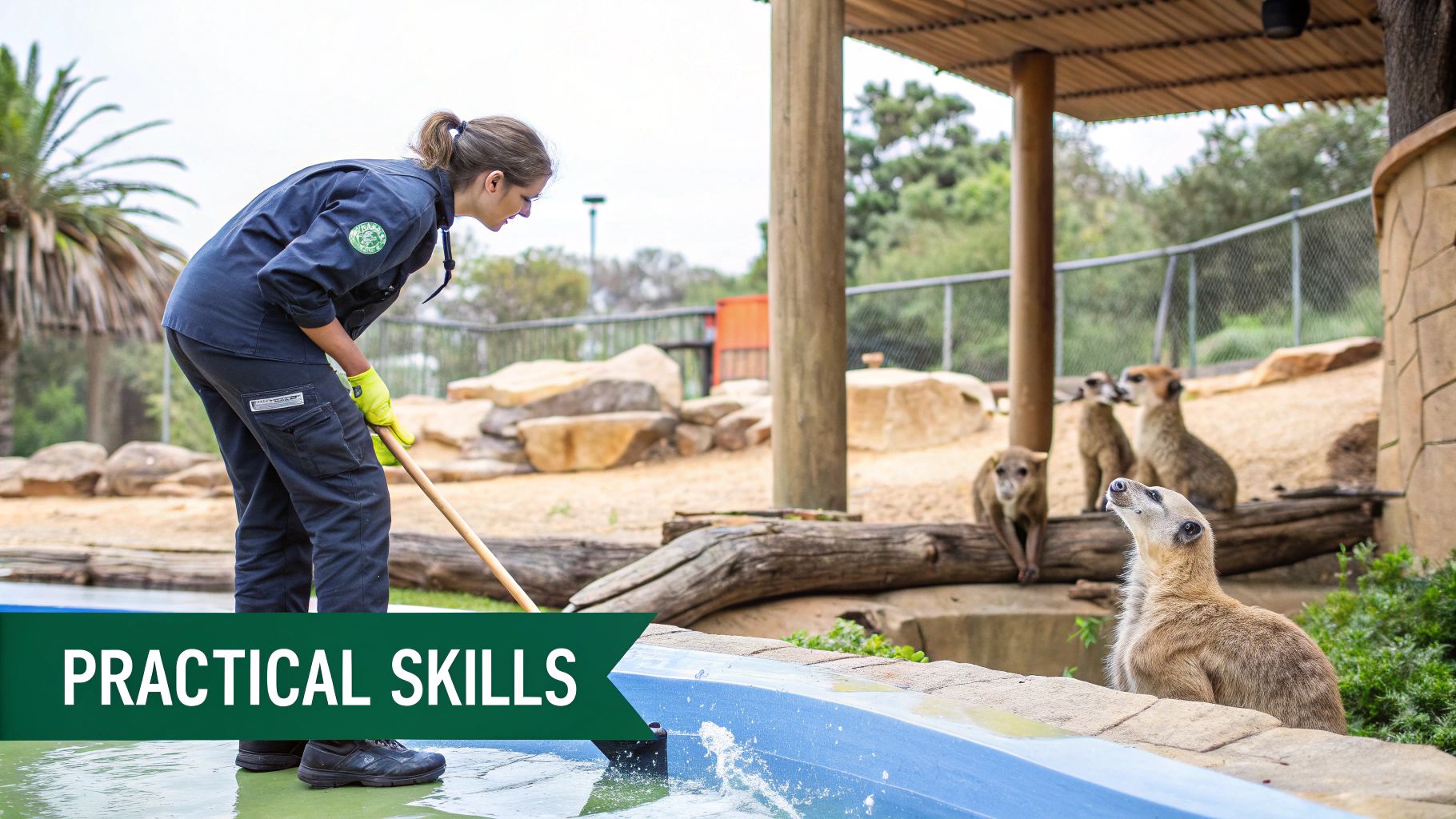
Do you think of zoos as depressing places where animals seem bored in their enclosures? It's a common image, but for modern, accredited zoos, it's an outdated one. The truth is, these institutions have transformed into vital hubs for global conservation, scientific research, and public education. They are on the front lines, fighting to protect endangered species from extinction.
If you have a deep passion for animals and want to be part of this crucial mission, your journey can start here. Forget what you think you know about zoos. Let's debunk some common myths and explore how you can turn your passion into a profession with the Level 3 Diploma in Zookeeping.
Myth 1: Zoos Are Just for Human Entertainment
This is perhaps the biggest misconception. While zoos certainly offer incredible experiences for visitors, their primary purpose has shifted dramatically. Today, reputable zoos are conservation organisations first and foremost.
The Reality: Conservation and Education Hubs
Modern zoos are deeply involved in protecting wildlife. Their work extends far beyond their physical walls through:
-
Breeding Programmes: They participate in global Species Survival Plans (SSPs) and European Endangered Species Programmes (EEPs). These collaborative efforts manage the genetics of captive populations, creating a "safety net" for species that are critically endangered in the wild, like the Amur leopard or the Californian condor.
-
Funding Fieldwork: A portion of your ticket price often goes directly to in-situ conservation projects. Zoos fund initiatives that protect natural habitats, combat poaching, and reintroduce animals back into their native environments.
-
Public Education: Where else can millions of people see a living, breathing tiger or gorilla up close? Zoos provide a unique opportunity to connect people with wildlife, fostering empathy and inspiring a new generation of conservationists. They teach visitors about the threats animals face and what we can do to help.
The entertainment aspect is a gateway. It draws people in, allowing zoos to deliver powerful messages about the importance of biodiversity and our role in protecting it.
Myth 2: Animals in Zoos Are Unhappy and Stressed
The image of a tiger pacing in a small, concrete cage is a ghost of zoos past. Animal welfare is now a complex science, and modern zookeeping is built around ensuring animals not only survive but thrive.
The Reality: A Focus on Animal Welfare and Enrichment
Zookeepers are highly trained professionals dedicated to the physical and psychological wellbeing of the animals in their care. The Level 3 Diploma in Zookeeping places a huge emphasis on this. Key practices include:
-
Enrichment: This is the art and science of keeping an animal's mind and body active. It involves creating stimulating environments that encourage natural behaviours. This could be anything from puzzle feeders for primates to scent trails for big cats or varied terrain for reptiles. The goal is to prevent boredom and allow animals to problem-solve, forage, and explore as they would in the wild.
-
Habitat Design: Enclosures are no longer just cages. They are complex habitats designed to mimic an animal's natural environment, providing opportunities for climbing, swimming, hiding, and socialising.
-
Expert Veterinary Care: Animals in accredited zoos receive some of the best healthcare in the world, with regular check-ups, specialised diets, and preventative medicine that far exceeds what they would get in the wild, where injury or illness often means death.

A zookeeper's role is to be a dedicated advocate for their animals, ensuring every aspect of their day is designed to promote wellbeing.
Myth 3: Keeping Animals in Captivity is Cruel
This is an emotional argument, and it's understandable. In an ideal world, all animals would live freely in their natural habitats. But we don't live in an ideal world.
The Reality: A Necessary Ark in a World of Threats
For many species, the wild is no longer a safe place. Threats like habitat loss, climate change, pollution, and poaching have pushed thousands of species to the brink of extinction. For them, accredited zoos are not prisons; they are sanctuaries.
Consider these points:
-
A Lifeline for Extinct-in-the-Wild Species: Animals like the Scimitar-horned oryx and the Przewalski's horse were completely wiped out in the wild. They only exist today because of dedicated captive breeding programmes in zoos. These programmes have allowed for their successful reintroduction back into protected areas.
-
Ambassadors for Their Species: Every animal in a zoo acts as an ambassador. They help researchers learn more about their biology, behaviour, and health, providing crucial data that can be used to help their wild counterparts.
-
Rehabilitation Centres: Many zoos also function as rescue and rehabilitation centres for injured or orphaned native wildlife, nursing them back to health with the goal of returning them to the wild.
Zoos are a critical piece of a much larger conservation puzzle. They are part of a global network working tirelessly to ensure future generations can share the planet with these incredible creatures. You can explore more about careers dealing with animals in our detailed guide.
How You Can Become a Professional Zookeeper

Do you feel inspired to join this vital work? A career in zookeeping is incredibly rewarding, but it's also highly competitive. Passion is essential, but it’s not enough. You need a formal qualification to prove you have the foundational knowledge and skills employers are looking for.
This is where the Zookeeping Level 3 Diploma (RQF) from Stonebridge College comes in. It is your structured pathway into the profession. The course covers the very topics we've discussed:
-
Animal Health and Welfare: Learn to monitor health and provide the best possible care.
-
Enclosure Design and Enrichment: Master the skills needed to create stimulating, naturalistic habitats.
-
Conservation and Breeding Programmes: Understand the science and ethics behind global species management.
-
Nutrition and Feeding: Develop specialised diets tailored to the needs of different animals.
This isn't just theory. The diploma includes a practical placement, giving you hands-on experience in a real zoo setting. You can read more about transforming your career with a zookeeper diploma and see how it opens doors.
Flexible Learning That Fits Your Life
Worried you don't have time to study? Stonebridge Associated Colleges makes it possible. With over 20 years of experience in distance learning, we offer a unique subscription-based model that puts you in control.
-
Study 100% Online: Learn from anywhere, at any time, fitting your studies around work and life commitments.
-
Affordable Monthly Fee: Instead of a large upfront cost or a complex credit agreement, you pay a simple monthly subscription.
-
Pause or Cancel Anytime: Life can be unpredictable. Our model allows you to pause your studies and payments whenever you need to, without penalty.
-
Expert Tutor Support: You'll be assigned a personal tutor to guide you through your course, providing feedback and support every step of the way.
This flexible and affordable approach ensures that financial worries or a busy schedule don't have to stand between you and your dream career in animal conservation.
Take the First Step Today
Modern zoos are not the problem; they are a vital part of the solution to the global biodiversity crisis. The animals within them are ambassadors, safety-net populations, and inspirations for the millions who visit each year.
The dedicated professionals who care for them are the backbone of this mission. If you have the passion, commitment, and desire to make a real difference, we can provide you with the qualification you need to get started.
Don't let outdated myths hold you back. Your future in wildlife protection is waiting.
Ready to stop dreaming and start doing? Turn your love for animals into a respected and impactful career. Take the first step today by enrolling on the Zookeeping Level 3 Diploma (RQF) with Stonebridge College.




